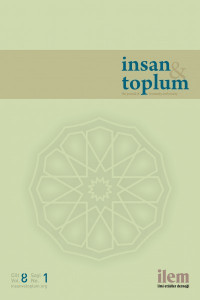Abstract
Dayanışma kavramı, sosyal bilimlerdeki kullanımı bakımından bir muğlaklık içermektedir. Sosyoloji disiplini içerisinde sosyal düzenin oluşması, bunun için gerekli olan şartların tespiti, toplumsal bütünleşmenin sağlanması gibi konularda kullanılan dayanışma kavramı, “özgürlük”, “adalet” ya da “eşitlik” kavramları gibi detaylı analizlere konu edilmemiştir. Sosyoloji disiplini içerisinde münferit olarak ele alınmamış olan dayanışma kavramı, birçok alanla kesişen konularla ilişkilendirilmiştir, fakat bu kavram ile ilgili klasik olarak addedilebilecek herhangi bir eser mevcut değildir. Yapılan çalışmalarda dikkat çeken husus, araştırmacıların farklı bağlamlarda ele aldıkları bu kavrama, ilgi alanlarına göre özel ve ekseriyetle yüzeysel anlamlar yüklemeleridir. Ayrıca kavramın başta Sosyoloji olmak üzere Etik, Siyaset, Siyaset Felsefesi gibi birçok disipline yayılan geniş anlamlar barındırması, kavramın daha çok cemaat yapılarına yönelik olması ve modern dünyanın cemaat tipi oluşumları dışlayıcılığı, artan bireysellik ve çoğulculuk neticesinde toplumsal ilişkilerin anonimleşerek müphem bir yapıya dönüşmesi gibi olgular, dayanışma kavramının anlamını muğlaklaştıran faktörler arasındadır. Dayanışma kavramına dair bu belirsizlik, bizi tarihsel bir kavram analizi yapmaya mecbur kılarak kavramın uzman filozof ve sosyologlar tarafından ne şekilde kullanıldığına sevk etmektedir. Çalışma, Batı düşünce dünyasındaki “dayanışma” kavramının tarihsel arka planına kısaca değinerek XX. yüzyıldaki (post-) modern düşünce hayatına mensup düşünürlerden olan Adorno, Habermas ve Rorty tarafından ne şekilde ele alındığını ortaya koymayı amaçlamaktadır.
Keywords
Modern Sosyoloji Toplumsal Kuram Dayanışma Adorno Habermas Rorty Modern Sosyoloji, Toplumsal Kuram, Dayanışma, Adorno, Habermas, Rorty
References
- Adorno, T. & Horkheimer, M. (2010). Aydınlanmanın Diyalektiği. (N. Ülner & E. Öztarhan Karadoğan, Çev.) İstanbul: Kabalcı Yayınevi.
- Adorno, T. & Horkheimer, M. (2011). Sosyolojik Açılımlar. (M. S. Durgun & A. Gümüş, Çev.) Ankara: BilgeSu Yayınları.
- Adorno, T. (1999). Geçmişin İşlenmesi Ne Demektir?. (T. Onur, Çev.) Defter, 38, 121-138.
- Adorno, T. (2009). Minima Moralia (6. Baskı). (O. Koçak & A. Doğukan, Çev.) İstanbul: Metis Yayınları.
- Adorno, T. (2010). Ahlak Felsefesinin Sorunları. (T. Birkan, Çev.) İstanbul: Metis Yayınları.
- Adorno, T. (2011). Eleştiri-Toplum Üzerine Yazılar (3. Baskı). (M. Y. Öner, Çev.) İstanbul Belge Yayınları
Abstract
The concept of solidarity contains an ambiguity in terms of its use in social sciences. Although it is one of the concepts used in subjects such as the formation of the social order, determination of the conditions, providing of the social integration within the discipline of sociology, it has not been a subject for detailed analyses like the concepts of “freedom”, “justice”, or “equality”. As a matter of fact, there is not a single work regarded as a classic related to this concept. The concept of solidarity, which has not been discussed as a separate subject within sociology, has been associated with subjects intersecting by many fields. In these studies, the striking point is that researchers use the concept differently from each other and ascribe specific and superficial meanings for the most part according to the subject. Also, the concepts’ having broad meanings spreading across many fields such as sociology in particular,as well as ethics, politics and political philosophy; the concepts’ being mainly aimed at community structures, and the modern world’s externalizing the formation like community; social relations’ transforming into a vague structure by being anonymized etc. are among the factors ambiguating the meaning of the concept of “solidarity”. This uncertainty about the concept of “solidarity” will oblige us to analyze the concept and lead us to looking at the way the concept was used by experts (philosophers and sociologists). Referring to the historical background of the concept of “solidarity” in the world of the western thought, the study aims to reveal how it was discussed by the thinkers connected with modern sociology in the 20th century such as Adorno, Habermas and Rorty.
References
- Adorno, T. & Horkheimer, M. (2010). Aydınlanmanın Diyalektiği. (N. Ülner & E. Öztarhan Karadoğan, Çev.) İstanbul: Kabalcı Yayınevi.
- Adorno, T. & Horkheimer, M. (2011). Sosyolojik Açılımlar. (M. S. Durgun & A. Gümüş, Çev.) Ankara: BilgeSu Yayınları.
- Adorno, T. (1999). Geçmişin İşlenmesi Ne Demektir?. (T. Onur, Çev.) Defter, 38, 121-138.
- Adorno, T. (2009). Minima Moralia (6. Baskı). (O. Koçak & A. Doğukan, Çev.) İstanbul: Metis Yayınları.
- Adorno, T. (2010). Ahlak Felsefesinin Sorunları. (T. Birkan, Çev.) İstanbul: Metis Yayınları.
- Adorno, T. (2011). Eleştiri-Toplum Üzerine Yazılar (3. Baskı). (M. Y. Öner, Çev.) İstanbul Belge Yayınları
Details
| Primary Language | Turkish |
|---|---|
| Subjects | Sociology |
| Journal Section | Research Articles |
| Authors | |
| Publication Date | March 15, 2018 |
| Published in Issue | Year 2018 Volume: 8 Issue: 1 |


